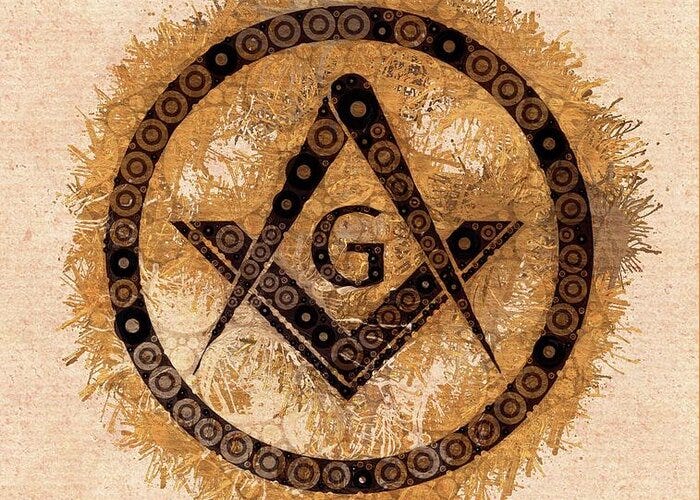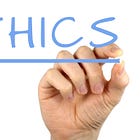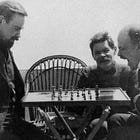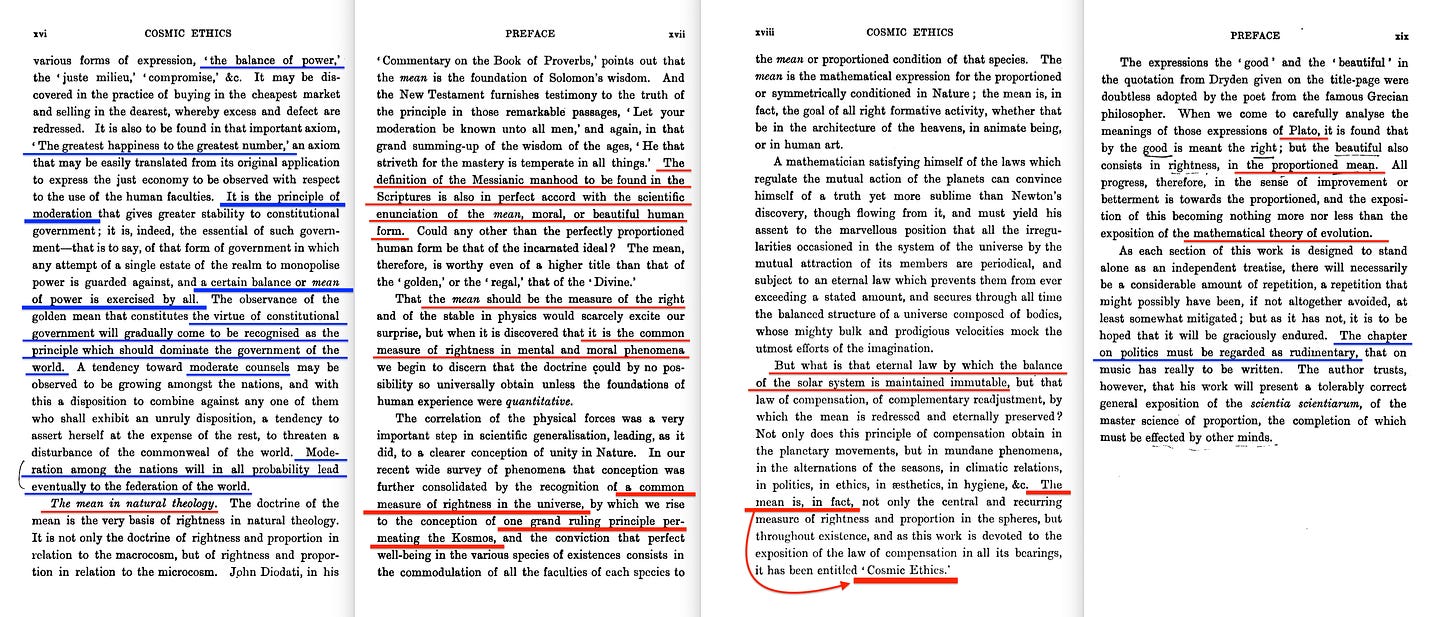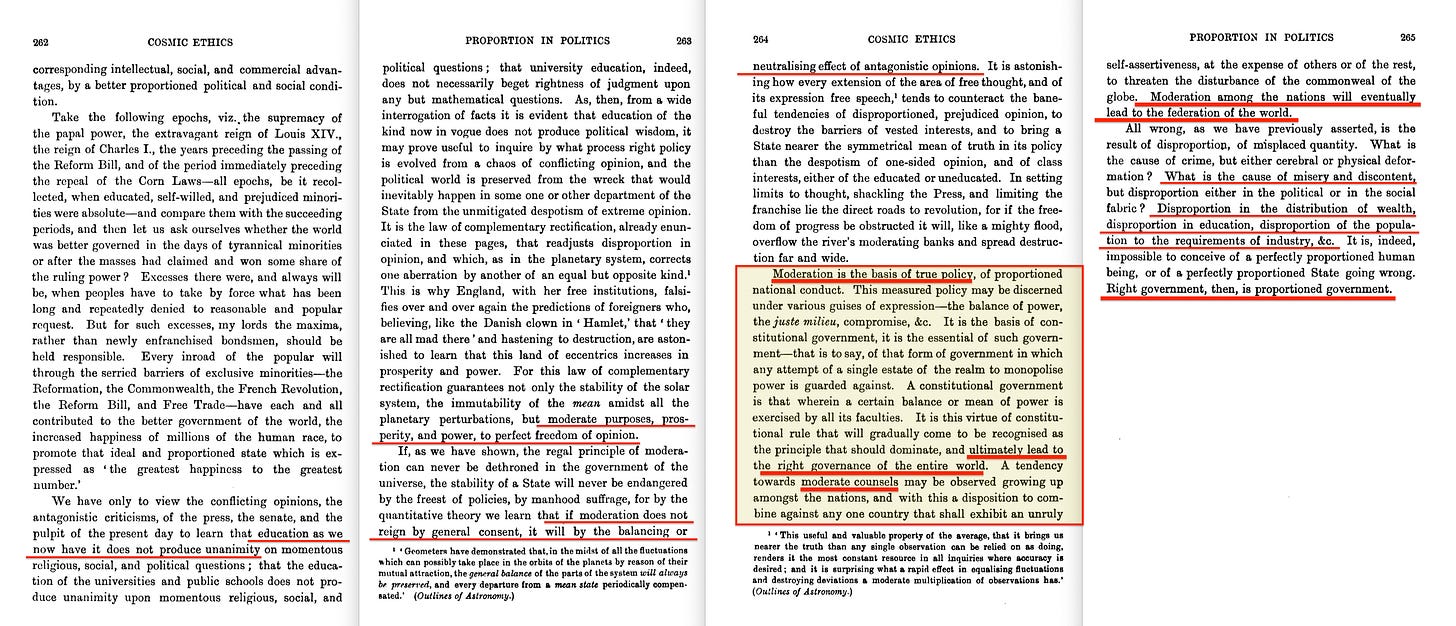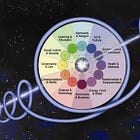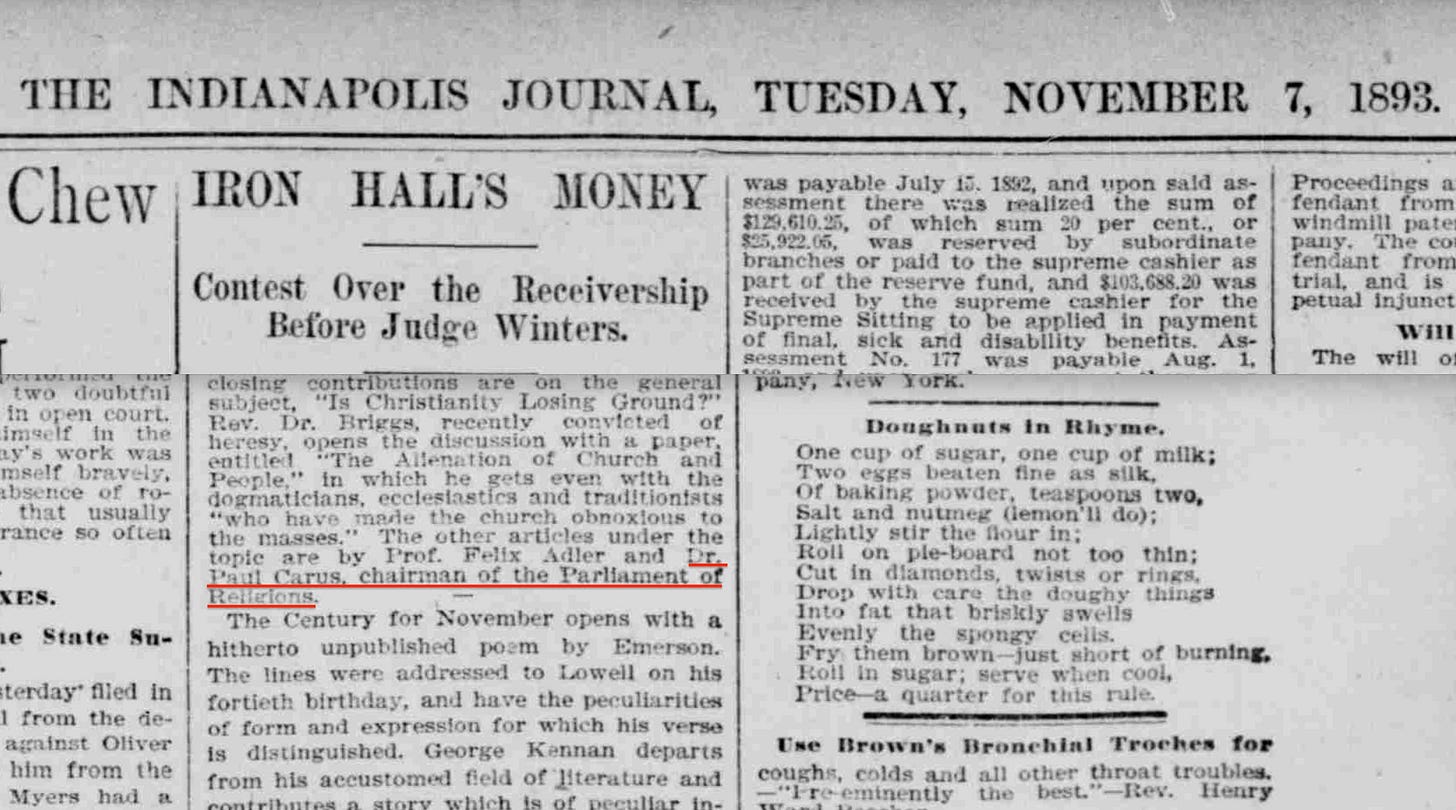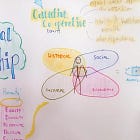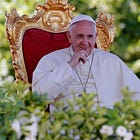When I first located the obscure Victorian, William Cave Thomas, I wondered why he didn’t receive much attention. Especially as his 1896 book, Cosmic Ethics, appeared to hit rather the few notes.
But having located some of his earlier writings, I now suspect I understand why he’s remembered, primarily, as an obscure artist and a painter1.
You probably wonder—who is this obscure individual, and why does he matter. Well, that’s a bit hard to answer at this stage, but do stay with me. I did manage to locate five books of his—yet, when I attached these to my most recent substack article, they were practically deleted immediately. And this appears a tad odd given than the most recent is from 1896, and not exactly an international bestseller. Either way, let’s begin in 1882, the year in which he contributed an essay titled ‘The True Higher Education, or Proportioned Culture’ to the Journal of Social Science2, if for not other reason but this essay being written back when their abilities in terms of Aesopian framing was clearly less well-developed.
‘The theory of the modern scheme of education, if this can be said to have any theory, has not the faintest semblance of scientific precision. Exact quantitative analysis, the unfailing evidence of true science, is not to be found in its statements. Rule of thumb prevails. According to modern notions, that is the higher education, which includes the greatest number of subjects in its curriculum. The leading educational aim of these days would appear to be that of cramming as much knowledge as possible into a man; a process which dissipates intellectual power, and produces shallowness.‘
This—of course—is hard to disagree with. And that’s the express point. By framing an opener in agreeing terms, you’re lured in, more open to accept plain absurdities down the road. They still use this trick.
Whereas, the Science of Education, when thoroughly worked out, as I have worked it out, shows both assumptions to be erroneous, and that they lead to a waste of vital power, and a misuse of the human faculties. The true Science of Education is nothing more nor less than the enunciation of the laws of the right distribution… that proportioned culture, or training calculated to effect the symmetrical development of all the faculties of the intellect, …
But already here it starts to go a bit awry. We speak of moderation, of Aristotle’s Golden Mean, of avoidment of extremes, Stoicism.
Educators have not yet learnt that every science requires precisely the same intellectual faculties for its successful prosecution, viz., observation, memory and reason. Knowledge, (the stores of knowledge,) should be regarded merely as materials for the use of the intellect, and not as in themselves, when garnered in the memory, constituting intellectual power.
Every science is to be considered as based upon essential building blocks, and knowledge is to be put into use to this extent. Of course, how you—or anyone else—is supposed to know up front what you might need to know down the road is another question altogether—and certainly not one Thomas has any interest in answering.
And it should be steadfastly borne in mind that knowledge itself can never be properly utilized unless the brain be developed into a perfect intellectual instrument.
Ie, unless ‘you’re taught how to use this knowledge’. After this, Thomas begins to build his argument in more concrete terms:
The very use of the word bias, either in reference to the intellect, or to the physique, implies some natural specialization or disproportionate development, that ought in itself to be sufficient to deter men from attempting to increase what is already in excess; for, according to the laws which regulate the economical distribution and use of the limited power in living beings, power cannot be used to excess in any special direction, in a living organism, without some other portion of that organism being deprived of its due of exercise, and development. A principle more fatal to intellectual and technical excellence than that of cultivating the strongest bent, could not well be devised.
And his argument can be summed up in precisely one word: mediocrity.
See, Thomas does not want anyone to stand out from the crowd. Where a logical conclusion would otherwise want people to specialise within a field at which they’re competent to the benefit of society of all, Thomas sees a different path for society:
Whether man be regarded as in decadence from the proportioned manhood of the creation, or, according to the hypothesis of evolution, as progressing towards that symmetrical, or proportioned condition, that symmetrical constitution of the human nature is really the ideal to which, by the Christian doctrine, he is to be restored, and by the scientific, he is to be progressively developed.
The modifiability of organization, …
No, what Thomas wants is man progressing towards common mediocrity.
And we’re all born with qualities—or lack thereof. In school, for instance, I didn’t perform particularly well in sports, and consequently wouldn’t tend to spend much time on it—nor be picked first, for that matter. But then, I come from a long family line of proud, incompetent sportsmen. But had it been up to Thomas:
The endeavor to exaggerate any natural bias, is, in plainer words, the endeavor to increase some congenital and, possibly, inherited disproportion.
Yet, per Thomas, this is exactly the reason why this ‘talent’ of mine should be developed—as opposed to spending my teenage years on computers and reading popular science magazines. No, that would just be selfish and irrational.
… from the first dawn of intelligence, there is with every advance in organization, a corresponding advance in mind...with every advance in organization, there has been intellectual progress, the true aim of education should manifestly be the improvement of organization.… if she not merely fails to improve organization, but, by the wrong means which she adopts, actually deteriorates it, she really undermines and weakens the human intellect, and the result must inevitably be mental decadence instead of progress.
This is really interesting phrasing for two reasons; first, because it makes the blanket statement that an advancing mind is the express outcome of an advancing organisation, and the aim of education should thus be centred around educating about organisation, which ultimately can be described as ‘social science’. But the second reason why this is of note is because it removes the ability of man as an individual to progress society as a whole, which is patently absurd. It’s in short an attempt to monopolise human advancement through collective effort, dismissing the individual’s efforts wholesale. It is, for lack of a better word, a collectivist mindset. And as for said education:
An educational system, having a formative, or proportioning aim… Mankind is becoming more and more intellectually superficial. I shall, therefore, follow up the preceding remarks with a brief exposition of a system of symmetrical training,* designed to develop intellectual and physical completeness. The perfect efficiency of the human mind and body decline, necessarily decline, as men become disproportioned. Disproportion is the fundamental characteristic, the essential characteristic. of all the ills that affliet the world.
Mediocrity is a societal strength, a virtue, and any attempt to develop natural inclinations leads to disproportion—allegedly the cause of all ills of the world, per Thomas.
The very inferiority of other creatures consists in their more specialized, or biassed organization… The endeavor to specialize the human nature is, therefore, a retrograde educational policy; it means either in a lesser or greater degree, decadence.
Thus, educational policy must focus on mediocrity. He continues through the classical greeks (mainly Aristotle) before adding:
Proportion is not only the basis of art; it is the basis of education; it is the basis of conduct; it is the basis of politics, and it is the basis of natural religion.
Proportion—balance—also applies to… politics. That’s very, very interesting, as it sounds straight down the middle of the ‘mediator approach’, ie Bernstein, Julius Wolf, etc… though you can could consider that a ‘consultative approach’ if you’re a Baha’i.
… we shall endeavor, under three heads, to fortify the arguments we have already adduced in favor of porportioned culture. These heads are:
(1.) The Definition of the Symmetrical, or Proportioned Manhood.
(2.) Can Organization be modified, improved?
(3.) The Means for Developing the Proportioned Manhood.
And Thomas immediately begins by adding arguments in terms of the former:
The Definition of the Symmetrical… In like manner the intellectual form, if I may so express myself, should be in such just proportion that it should be proof against adverse criticism; this also, should be neither in excess nor defect in any single particular. The proportioned or ideal man, therefore, consists in the proportioned mind, in the proportioned body;
The intellectual form relates to one which can neither be criticised nor ‘in excess’. In other words—ideal man is mediocre man.
And just to nail that argument down:
The symmetrical, or proportioned, organization is that moderated constitution of the human nature, in which every faculty preserves a mean between its possible maximum and minimum developments. The proportioned manhood is, therefore, a synthesis of mean conditions, of all the human faculties in their mean developments.
And to that extent, if only we had some way of running systemic surveillance, we could essentially determine:
The method of averages is the method of modern science; and could we obtain precise measured data of the differentiations of every faculty in different individuals, we could accurately determine its mean, proportioned, or right development, and so, in the aggregate, the canon of the proportions, intellectual and physical, of the ideal man.
… what ideal man should comprise. This is truly hardcore collectivist ideology.
It is on this account that controlled, judicious, physical training becomes a valuable adjunct to right intellectual culture. The proportioning of the physical faculties is an indirect means, by a reflex action as it were, of proportioning the intellectual.
Which is fascinating, because it suggests that anyone gifted intellectually, would be sent to the sports pitch, whereas those naturally gifted footballers would spend far more time in physics and chemistry classes than they would otherwise prefer.
In other words—this isn’t so much of an education, but rather a deliberate exercise to dumb down children’s education. But it’s not enough to apply these sinister principles on an individual level, oh no:
The law which obtains with regard to the whole, together, also holds with reference to every faculty; or in other words, the mean development of any faculty properly belonging to a species, is the typal proportion of that faculty, in that species.
See, these ‘principles’ should apply to the entire species as a whole. Common mediocrity. The deliberate destruction of education for good.
This is the reason why it is the duty of the trainer of youth to take means to repress the extreme manifestation of any particular phase, any special phase of the human nature, by advancing that other portion of it which is in defect.
Which logically applies to the educator in the classroom or sports trainer. If the former, send to the latter. If the latter, send to the former. And it’s at this stage Aristotle becomes of use:
… the proportioned constitution of both mind and body, is the one only condition of perfect well-being, of perfect health… Aristotle long since perceived that moderation was the scientific basis of morals. The proportioned is, therefore, the moral intellect; and the proportioned beautiful, or ideal form, the moral form.
See, science is the basis of morality, and the moral intellect relates to moderation.
Next, Thomas begins on the topic of organisation:
Can Organization be Modified, Improved?… It is the successive increments of improvement in the flux of time that accomplish so much. This is, indeed, the process of evolution, a natural process that, having been once demonstrated, increases the obligations and responsibilities of education… man is to be gradually perfected, body as well as soul, by the faithful observance of the divine moral law.
Education, in essence, is to be used as a tool, enabling this transition.
The hypothesis of progressive development does not regard organization as merely being capable of modification within very narrow limits, but of being developed from a rudimentary to a proportiond, a perfected, condition.
Organisation, in short, is to be developed to enable the perfect, ideal man of astonishing levels of perfected mediocrity. And skipping past Darwin:
It is the doctrine of progressive development… that renders the doctrine of proportioned culture so important, because it demonstrates beyond all possibility of doubt that the proportioned manhood may be developed. Common sense revolts at the notion that a tendency towards disproportion can be indicative of human progress; it is, on the contrary, unmistakable evidence of retrogression, of decadence. Evolution in the sense of progress towards well-being in existence must, therefore, be towards the proportioned.
Progressive development (of organisation) depends upon proportioned culture, through which proportioned manhood will be developed. And evolutionary progress must thus be proportioned, as it leads towards well-being in existence.
It is only by associating the doctrine of proportion with the doctrine of evolution, that we can thoroughly comprehend what progress means, and to what end the destiny of our race is being shaped.
Evolution is to be proportioned, as this enables progress and destiny towards… common mediocrity. All of a sudden, this takes on TH Huxley’esque form.
… through the generations. The improvement of organization in a lifetime would, perhaps, be of comparatively little account, … In these reflections, therefore, we perceive the enormous responsibility attaching to Education, …
I frequently see these claims, that people do not think over longer terms but their own. No, they do. They absolutely do. And education is crucial to that extent. Finally, we arrive with the third section, ‘The Means for Developing the Proportioned Manhood‘, and we’re hardly beyond the opening line before we encounter:
It is on the adoption of that central, formative, or setting-up education, that the future well-being of nations, nay, of the whole world, chiefly depends;
A call for centralised education, and if this is to benefit the whole world, then education must suitably be adopted. Oh, hi, Julian Huxley and UNESCO.
… the adoption of that education which shall have for its object the proportioning, or perfecting of the man, of the human mechanism, if I may so express myself, in its totality. To this end, we have to determine the simplest form of curriculum for training the native powers of the man;
This education, in short, is to be a training course for the cell in the human super-organism. A very perfected, mediocre one at that.
… sub-divided into three functions: (1), The Observing. or Collecting Function; (2), The Retaining, or Storing Funetion, the Memory; and (3), The Comparing, or Utilising Function, the Reason.
These three primary building blocks are inputs, memory, and outputs through execution. Thomas, in short, turns humanity into building blocks working through sheer logic. A human super-computer-organism, so to speak.
The body should not be developed to the detriment of the intellect, nor the intellect to the detriment of the body. Neither should the faculty of observation, the senses, be cultivated to the neglect of memory, and of reason;
All three core building blocks are to be equally cultured, forming the foundational layer of this ‘education’.
And it is for the proportionate adjustment of these we should provide in the framing of our formative eurriculum, which should comprise: (1), The National Language; (2), Ethics; (3), Drawing; (4), Music; (5), Mathematics; (6), Gymnastics.
I could highlight all six, but three stand out:
The national language for the power of correct expression; ethics for the principles of conduct; drawing and music for the training of the senses of sight, of hearing, and of touch; the mathematics as exercises for the reason; and gymnastics for the training of the physique.
See, this ‘education’ seeks to cultivate the ‘correct’ expression and conduct, both of which ultimately derive from science-based reason.
The sciences are conquests effected by great natural powers… The power to make science was pre-existent to the sciences themselves, and that is the power that education should endeavor to create.
And to that extent, education should facilitate an environment where science is pursued. Provided the science in question is ‘proportional’ and mediocre, I’m sure.
In short—Thomas says that science is to drive education, and this education relates to common mediocrity on a global scale, where culture should be used to cultivate organisation. And this culture should be based upon ethical principles, derived from the same science which Aristotle stated was the basis of morality.
Science, thus, becomes a global public good3, and man is to be ruled through a common morality, a global ethic so to speak.
You know this isn’t a ‘coincidence’, right?
Incidentally, Cave Thomas was quite the prolific writer—and not just in terms of books. No, he also contributed to ‘The Builder’. As to whether that carries masonic undertones… we’ll get to that. For now, here’s a collection of their material4.
In June, 1865, Thomas contributed the article ‘The Golden And Immutable Mean, the measure of the Scientific Ideal of the Good and the Beautiful‘5. And setting aside all obvious links to Neoplatonism, he begins with:
The following outline of a science of formative ethics… gradually extended to a survey of the whole phenomena of the solar system… there is scarcely any phenomenon which can be fully and completely explained without a union of several, perhaps of all the sciences.
It’s a holistic approach to science, and it appears to form the basis of phenomenology.
… the mean sometimes called the golden is the immutable law of rectitude in the solar system, and, consequenrly, the metrical expession of the scientific ideal of the good and the beautiful… by which the divinely appointed mean of well-being is preserved, by which erring nature is rectified and restored to its moral form.
The Golden Mean is the immutable law of rectitude, through which morality is restored, leading to a divinely appointed mean of well-being.
The theory of the Divine governance of nature set forth in formative ethics is founded upon the evidence of science.
And this Golden Mean is founded upon scientific reason.
The progress of science and art is always from the vague and complex to the definite and simple
Take scientific reason, convert into an ethic, a common morality, and use art to simplify, to make the mediocre commoner understand. We essentially have strong undercurrents of Alexander Bogdanov’s Proletkult here—not forgetting his position on this being used to gradually shape human organisation, which sees its parallel in Bogdanov’s Tektology, the precursor to General Systems Theory.
… the theory of formative ethics… the immutable mean is the ultimate term of scientific inquiry beyond which lies the region of faith.
Scientific inquiry, thus, ultimately leads to the Golden Mean, beyond which… well, suffice to say that this resonates not least with the Baha’i world view—though it’s obviously sold on the premise of being in harmony with Christianity. It isn’t, of course, which is hinted at through the inclusion of:
… not only of re-forming, but of increasing the power, and extending the bounds of Christendom.
And that lying is par for the course is established firmly through:
… the word ‘truth’, for instance, constantly thwarts just conclusions…
We are speaking proper, post-modernistic, subjective truth, challenging the idea of a single, universal, objective truth, but rather argues that what we call ‘truth’ is often a product of social, cultural, and historical context:
The question should be—not what is truth, but—what is right in nature… as facts, either right or wrong, it is the province and highest aim of science to determine the law of rectitude… the supreme law; the law of God manifest in nature…
This isn’t about your ‘facts’, no, this is about ‘what’s right in nature’, established through the same kind of collectively-subjective interpretation of scientific fact proposed by Bogdanov through his Empiriomonism.
… which is the basis of moral science; the law which gives true critical powers of discrimination, a forecast of the future, in brief wisdom!
Science, converted into morality, which can allegedly even be used to future project.
… hence the Old and New Testaments, comprehending such a law, predict a new earth, a world confirmed and restored by moral ideas and forces to its moral form.
What Thomas sells is a (collective-subjective) universal moral framework.
… upon this theory all sciences will ultimately be considered branches of metronomy, and all phenomenal differences as definite proportional differences… the imponderables, as they are called, are only modes of motion.
Phenomenology, per this view, is also a matter of proportion. And the inclusion here of modes of motion hints at a somewhat Spinozean outlook.
… notwithstanding all the variations, fluctuations, or aberrations which can possibly take place in the solar system, the general balance of its parts will always be preserved, and every departure from a menn state periodically compensated…
This principle—the Golden Mean—in short is cosmic.
… the system can never be destroyed or subverted by the mutual action of its parts, but keeps constantly oscillating, as it were, round a certain mean state from which it can never deviate to any ruinous extent.
And this cosmic principle ensures balance through the universe.
… the limite of the variation of ratios, I believed I had detected a universal moral low presiding over the near and the remote terrestrial and planetary phenomena, viz., that every aberration from a menn state of any system of being must be compensated at some time or other by one of an egual but opposite kind, i.e., in excess by one
Et voila. The Golden Mean is a cosmic principle—it’s a universal moral law. Mediocrity is an immutable measure of well-being in nature.
Wait, that doesn’t sound quite right.
This enables us to comprehend the inevitable penalties of extreme action, the necessary reaction, the fitful oscillations which the eternal principle of right in nature demands till compensation be effected; and that it is the duty of man as a responsible agent to avoid and prevent to his utmost departures from the golden mean.
And human duty is to align with mediocrity.
Thomas further contributed to an 1879 issue of ‘The Builder’6 through which we learn:
The Golden Mean is to him the keystone of the philosophy of the future, of a mathematical solution of the intellectual process, and of the moral law. He maintains that the form of our experience, of our cognition, is a quantitative or mathematical form, and that the selsame principle which finds mathematical expression as the mean is the universal expression or measure in nature the good and the beautiful.
Mathematics, in short, is centric to Thomas’s vision.
Doctrine of the Golden Mean in reference to cosmical phenomena, to asthetics, hygiene, education, ethics, politics, and natural theology.
And the Golden Mean applies… to just about everything…
The same principle obtains in reference, as we have stated, to the orbiting of the planets. The author maintains that a great moral principle having a mathematical expression is supreme in the cosmos.
Aesthetics, hygiene, education (previously discussed), and ethics:
… for the science of ethics is a science of the moral hygiene, in which the principle of the golden mean equally holds good… Aristotle... Nichomachean ethics… founded on a qualitative or mathematical basis, in which the mean is recognised as the principle and measure of moral rectitude.
Most of this repeats the above, but here’s an interesting inclusion:
Politics… balance of power… greatest happiness to the greatest number… that distribution which undoes excess, and would give to every man his due or mean of wealth of power. It is the principle which gives stability to a constitutional government…
Politics—in short—also should be judged through mediocrity, though it presents no stretch to apply this in context of communism.
Anyway, at least they achieved on one principle, given contemporary politicians are impressively mediocre, refusing to stand up for anything, whatsoever.
… a balance or mean is preserved amongst the various estates of the realm… constitutional governments… to promote the general happiness… the common interests of mankind. Moderation amongst the nations would, in fact, be federation.
It’s funny how this is casually lobbed in, because this was actually a serious drive around the time the United Nations came to be—with Einstein on board7.
Natural theology… the golden mean in Biblical ethics… how consistent the Scriptural enunciation of the Messianic manhood is with the holden principle…
… but let’s move on to the main event.
So, with this all in mind, let’s take a look at Cave Thomas’s 1896 book, titled ‘Cosmic Ethics’8. I was going to do a fairly shallow review, but since the W Cave Thomas books I uploaded only a few days ago were all taken down, I decided to spend a bit more time on it, beginning with the preface.
The doctrine of the mean may, nevertheless, have been taught as an esoteric dotrine. The science of proportion might, in its fullness, have been known to the early Freemasons, to the Pythagoreans.
Yikes!
But it suddenly dawns upon you that the preface… essentially is very, very similar to his 1879 article in ‘The Builder’, above. This, to me, is somewhat astonishing, as it’s rare that you keep a vision, an ideology entirely intact for 17 years. Especially if you’re an ideological pioneer. Either way, let’s fast forward through this.
The mean in ethics… The moral conduct of the entire human system is nothing more nor less than the proportioned conduct of that system.
And finally:
The mean in politics. The principle of the mean, of moderation, is the basis of true policy, of proportioned national conduct.
Moderation, moderation—even in governance:
' The greatest happiness to the greatest number,'… and a certain balance or mean of power is exercised by all. The observance of the golden mean that constitutes the virtue of constitutional government will gradually come to be recognised as the principle which should dominate the government of the world. A tendency toward moderate counsels…
And the logical conclusion?
Moderation among the nations will in all probability lead eventually to the federation of the world.
Yes, the logical conclusion is a drive for World Federation—some 23 years before even the League of Nations came to be. But, clearly, the world is not enough:
In our recent wide survey of phenomena that conception was further consolidated by the recognition of & common measure of rightness in the universe, by which we rise to the conception of one grand ruling principle permeating the Kosmos,
No, we quite simply require cosmic ethics, which then immediately draws in the likes of Ken Wilber9. And should there be any doubt:
But what is that eternal law by which the balance of the solar system is maintained immutable… The mean is, in fact, ‘Cosmic Ethies'
The universe—by logical extension—must be exceedingly average.
The contents section outline how this principle—doctrine of the mean—applies to his mathematical theory of evolution, our planetary system, aesthetics, art, colour, music, smell, taste, hygiene, education, development of man, ethics, politics and religion. It’s pretty comprehensive, really.
The first chapter relating to mathematics outline how this all ultimately comes down to ratios, while the next chapter aligns this with planetary systems—and we already saw what role education plays in this strategy.
And if you noticed I left out a chapter, well done.
The chapter on ‘Science of Ethics’, essentially, is all about Aristotle’s virtue ethics, where virtue relates to a mean state, and the habit thereof.
And don’t you ask silly questions like, oh, ‘what is the mean’?
This chapter is, in truth, fairly tedious and boring. However:
On the subject of truth, therefore, let him who is in the mean state be called truthful, and the mean truthfulness; but the pretence to truthfulness on the side of excess is arrogance, and he who has it is arrogant; that on the side of defect is false modesty, and the person falsely modest
… Thomas suddenly clarifies exactly what constitutes ‘truth’ - and it naturally does not relate to anything factual, but rather the mean itself!
Now that moral virtue is a mean state between two vices…it is, therefore, difficult also to be good; for in each case it is difficult to find the mean; just as it is not in every mans power, but only in the power of him who knows how, to find the centre of a circle…
Ah gee, it is clearly not for you to ultimately determine what constitutes good.
Thomas continues, outlining not just the role of Aristotle, but science in general:
In the Aristotelian ethics, then, we recognise the same principles of rectitude derived from human nature as from the larger phenomena of the planetary system-principles which have been accepted as the foundation of a system of scientific morality, not only by the Greeks, who of all the peoples of antiquity best understood the object and necessity of a formative science, the moulding of men, but which are still recommended as profitable study in the curriculum of & complete education.
Science is to provide morality. But, see, there’s a problem with Aristotle, because:
The principles of the Nicomachean ethics, being derived from and applied to a particular section of (human) nature only, want that broader basis of facts on which we can now reason and build, and are therefore frequently obscure in their application.
Nichomachean ethics only relate to human nature (it was later extended, though not by Aristotle himself). Thankfully, Thomas came along, and applied it to planetary systems, and who knows what else. But in this regard:
We have yet further confirmation of the fact that man's true purpose is that of moderator,
But—obviously—only if man knows how to find the centre of the circle.
And you most certainly won’t be able to, so don’t get any funny ideas.
Next comes the chapter on ‘The Science of Politics’ through which we learn:
The ever-increasing purpose from below has been the demand for & greater equality of power and of wealth,
And that, of course, is true, as it was sold under the ultimately meaningless term, ‘socialism’. However, here’s the twist:
The 'cry' of Equality has been by the mob considered as a just 'cry,' as & 'cry' for the realisation of a fiat of Nature, whereas Nature persistently repudiates equality, save and except as an artificial creation. Nature abhors equality as she does extreme difference.
Nature hates equality! Bet you didn’t see that one coming!
Nature abhors equality as much as she is said to do a vacuum. Those who insist on equality in intellect, in position, and in wealth do so possibly in the fervent belief that equality is an abstract, an ethical principle of rightness… More careful observation, however, revealed the fact that the orbits of the planets were not circles, but ellipses.
It’s a valid argument. Should we share all the world’s wealth, it would very quickly return to those who’d gathered it, precisely because the knowledge to gather said is still monopolised. And that’s almost unavaidable.
If power and wealth could by any possibility be equally distributed today, unless men should have been miraculously made intellectually and physically equal, power and wealth would again lapse into unequal distribution tomorrow.
In other words—we have established that Cave Thomas is not a capitalist, nor a socialist. So that begs the question—what exactly is he?
… mankind may be brought to that moderated or proportioned state of things that should be our true mark, our true goal, the golden mean.
Ah, he represents a third way, you say?
And that’s not the only admission in this chapter. Because though he likes to wax lyrical about freedom of scientific inquiry, reality somewhat differs:
… popular intellectual ferment, however, requires careful watching and guiding into the right channel.
… and it’s an Ethical Approach, just as it was when the ICSU’s SCRES saw the light of day in 1996 (with UNESCO’s COMEST following in 1997). And these initiatives—well, the objective was initially to control science, ultimately culminating with ‘ethics disclaimers’ in every field, including mathematics.
And this principle naturally extends to education:
… the main objects of a proportioned policy is, therefore, the education of right thinking; the encouragement of free thought goes without saying, but for free thought we should write proportioned or correct thought, of which comes right activity, and this is most likely to be effected by a true system of education, by a symmetrical system of education.
Total control over education and scientific endeavour.
… the commonweal of a State depend upon the just or proportionate distribution of power and wealth among the entire population. The commonweal of the State is the next desideratum to that of the commonweal of the world. Though the idea of a world policy has scarcely yet been entertained, we must nevertheless gradually rise to a political motive above all local interests, above all unionism for the assertion and enforcement of special interests.
And these principles of ‘just’ distribution of power and wealth amongst the people must quite simply be applied to all nation states, on a global basis. And to this end, what is quite simply called for is:
… the breaking down of prohibitory tariffs tends to balance the whole commercial and social world, …
Using neolineral trade practices to break down borders. This is expressly the argument laid out by Leonard S Woolf, in his 1916 report, International Government. And this report through Alfred Zimmern became a foundational blueprint for the League of Nations, and ultimately—the United Nations.
Finally, to wrap up the chapter:
Moderation is the basis of true policy… this virtue of constitutional rule that will gradually come to be recognised as the principle that should dominate, and ultimately lead to the right governance of the entire world. A tendency towards moderate counsels may be observed growing up amongst the nations, …
The ‘right governance’ is not ultimately what you vote for—it’s what’s considered ‘proportional’ and ‘moderate’. And just to hammer home:
Moderation among the nations will eventually lead to the federation of the world… Right government, then, is proportioned government.
… and we’re back with eventual World Federation. In 1896.
I’m sure you recall from above how the pursuit of science was to be free… until it suddenly wasn’t. And I’m sure you recall how education… suddenly became a matter of embedding the ‘right thinking’ in man. And you might still wonder why I didn’t cover a particular chapter. Well, here it is, ‘The Transfer of Human Energy for Special Purposes‘:
… when man turns his whole power and concentrates his volition upon the attainment of some one property or perfection… he may almost compete… But, he can only do this by the temporary or permanent sacrifice of the proportioned cherecteristic of human excellence. by a transfer of vital energy from one part of the system to another.
Yes, do remember this critical insight. Mediocrity good. Not mediocrity bad. Baaaaa!
The possibility of man being able to modify his nature in this way proves how modifiable his organisation is…
They have banged this drum for more than 125 years.
If the vital energy be proportionately distributed, we have intellectual and physical symmetry; if disproportionately, unbalance, onesidedness, or deformity of some kind.
Even those who didn’t pay attention must surely have received the message by now, loud and clear—especially given its repetition every other page, but:
… without running the risk of permanently maiming the human nature, we must sometimes suppress one and sometimes another phase of our nature,
Yes, yes, the vital energy must be proport- wait, what?
The modifiability of organisation and the possibility of transferring the vital energy in the main to any side of the human nature gives the educator the power of taking advantage of bias, and of training men, ab initio, for any speciality, mental or physical;
… but which is baaaaaaaaa-d, right?
We hold that the cultivation of natural bias is a most pernicious doctrine, …
Ah phew, for a second I though you were going to…
This general power, or human symmetry, may sometimes be turned temporarily all to one side for the attainment of some important object;
Aaaaannd cut. W Cave Thomas literally spent the entire book brainwashing you into accepting that moderation is the objective, that balance is key to achieving cosmic unity—only for him now to outline ‘exceptions’, suggesting that it occasionally could be ‘switched off’ for sakes of the ‘common good’:
… for you can temporarily specialise the human nature when there is some urgent need for it… It should be recollected that neither a natural nor an artificial specialisation is the healthy state.
And there is yet another regurgitation of the principle of the Golden Mean, which—apparently—can be switched off as they see fit. However, that constitutes a problem, because what about that universal moral framework he’s promoted the entire time?
If we sanction the disproportioning of human nature, the encouragement of specialisation, we ought to be consistent, and to forego a fixed system of morality, for the law to one set of human proportions could not be the law to another.
Note that Thomas does not propose eliminating the system of morality, but rather, he implicitly propose the introduction of a dual aspect to this framework.
The individualisation of men, indeed, is in direct opposition to the principle of moral unification, at-one-ment, or at-mean-ment, as it tends to widen the constitutional difference between man and man, and to make obedience to one code of morality more and more difficult.
This specialisation, in short, does create an issue with the universal moral framework. So how could this individual specialisation possibly be compatible?
The proportioned manhood is that manhood which, take it for all in all, must, according to Johnson's definition of genius, possess the largest general power, …
And there it is. The setting aside of the universal moral framework on an individual level is temporarily allowed, but only provided that it improves society as a whole—in the serving of the common good.
Which then—again—calls for someone dictating exactly what that constitutes.
The final chapter is titled ‘Natural Theology’, which could be understood as:
We can only hope to obtain sound views upon the subject of natural theology, upon a science of religion, by a close investigation of human experience.
The Science of Religion. Yes, that does indeed logically follow. But let’s finish off the book before we go there.
… examining and analysing scientific knowledge that we should seek for evidences of the divine, for a revelation of the moral government of the universe.
And here’s the reference to our old friend acquaintance yet again:
If all men's minds were perfectly constituted and all knowledge were exact, would think alike and form the same conclusions on every subject, just as they do upon mathematical problems.
This really is not remote from Alexander Bogdanov’s Empiriomonism10, constituting a collectively-subjective interpretation of available scientific fact. Incidentally, the theory which saw him booted from the Bolshevik Party he co-founded11, as Lenin etc considered it subversive, and unaligned with Marxist ideology (which it is).
… an intellectual and enlightened world for a rational foundation for its religious convictions, and to the ultimate establishment of faith on a scientific and immutable basis.
This… increasingly comes across… aligned with the Baha’i world view.
We can afford to fast forward through these pages, as these fundamentally do not cover material not previously discussed.
That human progress is towards a synthesis of all the faculties proper to man in their mean development, and that this is attained by moral discipline—by the moderate or rightful exercise all the human faculties. We are also now beginning to discern that & providential proportionment of a similar kind has been going on in the Kosmos, …
If anything, this final chapter strips the defensive phrasing. And while I could make a meal out of his increased demands, requesting to simply waiver through what appears remarkably bold, unsubstianted claims, let’s instead get on with it.
There is the important fact, too, to be considered, that our total consciousness is a tertium quid, which is neither the objective material nor the subjective sense. Assert, if you will, that this third somewhat cannot exist apart from matter, from organisation, …
And there’s even a mention it all being not quite material nor spiritual, no, rather this is a third way of interpretation… which travels through a ‘hidden’ organisational structure… sooo…
Cybernetic Thomist Bohmian Pilot Wave Quantum AI Geometric Unity?
And though the above sentence may appear laboured, these concepts do gravitate towards the same objective—determinism.
We may gather, too, from experience that evolution in all things is towards a moderated or proportioned condition, and that there is a working together of all things for the good…
Or—alternatively—we might be tempted to describe this as Conscious Evolution.
Let’s see how far out Thomas pushes the boat next:
The popular leader is generally some specially qualified man fitted to remove some pressing immediate grievance, without reference to the broader requirements of the great common cause… In the course of time, however, men learned to look for their ideal leader, their Saviour, in a man endowed with large general powers, and not as of old time, in one possessing some special gift. Just as men have now learned to appreciate & nation possessing the widest sympathies, & world policy...
Yes, as man grows, he allegedly realises that narrow self-interest is quite simply no good, with a prime example of this being the heinous stench of corruption emanating from vd Leyen’s office. And as the chapter on Aristotle didn’t previously mention this:
… the incarnation of the ideal, of the proportioned man, free from either excess or defect; should be a very king of men intellectually and physically, so perfectly constituted that he could do unto others as he would they should do unto him, should be a prince fit to rule according to the divine moral law, and to lead men to victory against the powers of evil?
We also need an outline of a concept, broadly similar to Plato’s concept of the philosopher-king. Ie—those who can locate the centre of a circle.
And just to remind everyone that this is a merger of science and mathematics:
The prospect of that new land, of that promised land, and vita nova of metaphor, must have been discerned from a scientific a mathematical standpoint.
Before Thomas goes to compare his concept of Natural Theology with Scripture.
The final few pages adds detail on reward and punishment, which similarly is a core concept per Baha’i ideology. But it further adds a number of dubious claims, one example being:
if God did not exist there would be no supreme authority for right and wrong;
Well, no, that would fairly quickly materialise. But rather than waste time on this silly example—or even this:
That Nature does in various ways inflict punishment for wrong-doing is, therefore, strong evidence of the divine existence.
Let’s instead aim our focus on:
The new idea of sacrifice was self-sacrifice… the noblest form of self-sacrifice, either philosophically or religiously, is the sacrifice of the entire self for the attainment of some great end.
Ie, sacrifice yourself for the collectivist ideals, the promise of utopia. Sure, you can in the West apply under specific circumstances like war, but that’s not the intent here.
We have shown in the preceding pages that there are scientific analogues of several important Scriptural doctrines that would lead up to a natural theology similar to the theology of Christian teaching, analogues that would form the basis of the conception of a new church
Oh, you mean a global ethic?
It is conceivable that at some distant future a state may be so constituted that it shall be ruled, not by an actual human king, nor by & president, but under the concept of a divine kinghood. In such a state all homage would be paid to this ideal, all law and policy would be determined by a deliberative assembly, … But before this can come to pass, the doctrine of the golden mean must become at least & national, if not & world-wide doctrine
Divine kinghood? But let’s finish this book off on this note instead:
The doctrine of the mean is to be found, in some form, in most of the religions of the past, but in its wider comprehension it will constitute the very foundation of the religion of the future.
And there of course is a reason that’s a perfect place to call it a day on this book.
In essence, Cave Thomas considers the doctrine of the mean the central, organising aspect of ethics. Moral progress is a process of achieving proportion and balance, mirroring the equilibrium seen in nature, rooted in universal mathematical proportions. And this points toward a ‘natural theology’ and a universal church, synthesising religious ideals with the findings of science.
And that directly leads to…Paul Carus’s Religion of Science12, released just a few years priot—specifically, in 1893.
Because both W. Cave Thomas and Paul Carus propose a framework in which science underpin both moral principles and a new, universal form of religion. They both advance the idea that the natural world operates by consistent laws, and that understanding these laws—through scientific inquiry—enables humans to live ethically, leading to social and personal well-being.
Carus, further, highlights empirical verification and rational investigation as the bedrock of a ‘religion of science’. He holds that traditional religions can be revitalised by aligning faith with facts, derived from scientific inquiry. Ethics, thus, flows logically from an understanding of natural law: once one perceives how the world actually functions, it becomes possible—and obligatory—to shape behavior around these truths.
Consequently—both Thomas and Carus ultimately converge on a vision of universal morality. For Thomas, this centers on the mathematical and proportional harmony that shapes the cosmos. For Carus, it is the universal set of truths uncovered by the scientific method, resting on principles of mathematica. In each case, religion is not set against science but is seen as its natural extension: an ethical and spiritual interpretation of law-like realities.
Now, as for the question whether ‘The Builder’ is relates to freemasonry… who knows. But it certainly is not outside the realms of possibility, as W Cave Thomas13, himself, was a freemason14.
… and as for Paul Carus… well, apart for being a key driver of the Neo-Kantian Neo-Friesien school… he chaired the 1893 Parliament of the World’s Religions15, an event from hell itself, quite frankly. Oh look, and Carus palled about with Felix Adler, father of ‘Ethical Culture’. What are the odds?
… and Carus… incidentally also happened to be a16 freemason17.
I have spent rather a lot of time, tracking down what ultimately is the root of what we experience at present, and around a year back, I logically concluded that Global Governance through Global Ethics is, essentially, at the very heart of it.
And though I have frequently dismissed the freemasons as a ludicrous fantasy, there comes a time where I have to start objectively paying attention, regardless of what my subjective interpretation tells me18. Because a fair few things align.
And—just by coincidence—in 1993, the Grand Priory of England was restored after being in abeyance for nearly 450 years, except for titular Grand Priors19. Yet another astonishing coincidence undoubtedly, as this was the year in which Hans Kung released ‘A Global Ethic’.
And Kung in 2007 earned a ‘"Culture Award of German Freemasons" For a Lifetime of Service to 'the Craft'‘20. And Kung, further, was a senior theologian at the Second Vatican (1962-65), the event which finally corrupted Catholicism.
As for Kung’s ‘Global Ethic’… that was introduced at the centenary of the 1893 Parliament21—which Paul Carus chaired (above).
When I above stated that none of this is a coincidence, this is an opinion formed given fairly basic statistics. The statistical likelihood that all of the above converging this flawlessly is essentially equivalent to Hillary Clinton’s ‘fortune’, trading cattle futures in the 1970s22. In fact, it’s probably around the same statistical likelihood of the term ‘Cybernetic Thomist Bohmian Pilot Wave Quantum AI Geometric Unity‘ making rational sense. But yet, it does.
There has to be an exception to the rule, after all.


